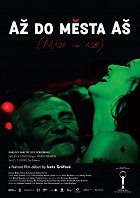Résumés(1)
A poignant story about a young girl named Dorotka, who hails from eastern Slovakia. Full of determination and naive expectations regarding her new life; she takes on the job of a seamstress in a small factory on the Czech-German border town of Aš. Due to the consequences of her own decisions, she is faced with a grim reality in the westernmost corner of the Czech Republic. Aš is a meeting point for people from both sides of the border. The girls who come to work in the factories would like to earn an honest and decent living, while the relatively well off Germans are in search of an inexpensive good time. Aš is like a Babylon of languages and morals, which are quickly broken down. "It was important for me to capture the motivations of the girls regarding harsh, life altering decisions and their surroundings, in a most authentic manner. These decisions may seem as amoral when looked at simply from the surface. (texte officiel du distributeur)
(plus)Vidéo (1)
Critiques (5)
Dès le début, Až do mesta Aš m’a paru être de niveau amateur. À tout le mieux, on pourrait parler d’un film semi-professionnel avec plein de non-acteurs. En tout cas, c’est comme ça que je le vois, parce qu’il n’y a pas grand-chose à découvrir du côté du scénario, aucune véritable évolution narrative. Certaines prises sont soignées, d’autres moins ; certaines images qui racontent l’histoire par des dessins m’ont paru très belles et créatives. Mais dans l’ensemble, ce film aurait besoin d’un dramaturge. Et je ne sais pas si c’était fait exprès, mais l’allemand est pitoyable et plein de fautes grossières !
()
I admire the courage with which the young director and screenwriter wagered on veristic observation, but that’s where my respect for this film begins and ends. The raw style, which in places blurs the line between documentary and fiction (like the line between muted and no dramaturgy), serves the story, whose direction and (insipid) outcome will be figured out in advance by every viewer who has ever seen a social drama. The film isn’t fully polished in conceptual terms. The introspective animated sequences, fondly used in performative documentaries, clash with the unempathetic protagonist in the live-action scenes. The director’s attitude toward Dorota embarrassingly alternates between “she is to blame” and “others are to blame”. In this respect, Petr Václav’s The Way Out is more clearly and more impactfully expressive even at the cost of certain simplifications. With the exception of one unpleasant, though in no way explicit sex scene, the film does not let us experience the mange and filth into which the protagonist descends. As a statement on aimless adolescence, Made in Ash doesn’t come close to the Serbian film Clip or the Israeli Six Acts. In the context of Slovak-Czech cinema, it is a praiseworthy attempt at something different; in the context of contemporary festival dramas, it’s nothing new. 50%
()
Thank goodness the sex scenes were blurry. Otherwise I would have to honor our dear Dorota with an even more satisfied evaluation. In the end, of course, it is necessary to shed a tear in Silvia's fashion.
()
When the movie ended, I thought that it was more of a documentary than a film. Then I read the fun facts about the movie and it was actually supposed to be like that. If I were to rate this as a movie, I’d rate it two stars or maybe even just one. Especially since there was nothing going on, the characters were bland, the (non)actresses were mostly just present in the scenes and it didn’t have anything a good movie should have. But once I reimagined it as a documentary, it made me sad; sad that Aš was represented this way and sad that these things happen over there. Many people view Aš as the westernmost Czech city and not much else. After watching this drama, I’ll view it as a city of dead hope for eastern girls. Sad, heavy and incredibly rough reality that has opened my eyes about the story of Aš.
()
I'm not sure exactly what this was supposed to be. A pseudo-documentary? A supposedly authentic record of how people live? The problems of our society? I find the amateur camera work annoying because what we're watching looks recorded at first glance. That authenticity is suppressed, so it just becomes a showcase of non-actors trying to demonstrate that our world is in a real mess. Well, it is, but what difference does it make? It's probably good that attention is brought to it, but it could be done differently without this pseudo... something.
()
Photos (25)
Photo © Peripher Film



Annonces